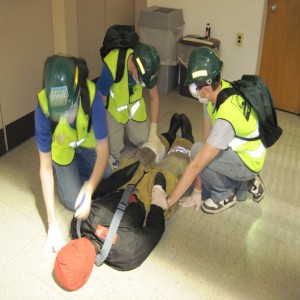 If you are thinking of a career in emergency management to be the first defense against natural or man-made disasters, then you may wish to become a Certified Emergency Manager (CEM). With professional certification as an emergency manager, you will have the credentials to help government agencies prepare for disaster, create emergency response plans, and work with elected officials to ensure that citizens’ and their property are protected in the face of danger. During an emergency, managers are also responsible for leading the response efforts, ordering evacuations, opening public shelters, starting rescue missions, and conducting press conferences. In order to get on the pathway to this rewarding profession, the following is a step-by-step guide to become and remain competitive as a Certified Emergency Manager (CEM).
If you are thinking of a career in emergency management to be the first defense against natural or man-made disasters, then you may wish to become a Certified Emergency Manager (CEM). With professional certification as an emergency manager, you will have the credentials to help government agencies prepare for disaster, create emergency response plans, and work with elected officials to ensure that citizens’ and their property are protected in the face of danger. During an emergency, managers are also responsible for leading the response efforts, ordering evacuations, opening public shelters, starting rescue missions, and conducting press conferences. In order to get on the pathway to this rewarding profession, the following is a step-by-step guide to become and remain competitive as a Certified Emergency Manager (CEM).
Earn a Relevant Bachelor’s Degree
Although some smaller local governments may hire job candidates with only a high school diploma and more extensive work experience, the majority of emergency managers will need to have at least a bachelor’s degree in a related field. Since emergency managers need to build strong communication, critical thinking, decision-making, interpersonal skills, and leadership skills in rather stressful emergency situations, it is normally recommended that you pursue a degree related to law enforcement, public administration, disaster planning, fire science, or even business administration, according to Emergency Management. While not as plentiful as other majors, there are several top-ranked universities nationwide that offer bachelor’s degree programs in emergency management too.
Obtain Years of Work Experience
Applicants who are seeking to become Certified Emergency Managers (CEMs) usually need to have multiple years of prior work experience in a related field before receiving this promotion into a leadership position. Many emergency managers get their start by working as police officers, detectives, firefighters, safety technicians, police dispatchers, paramedics, emergency medical technicians (EMTs), and other roles related to emergency management. Not only will having previous work experience demonstrate that you can work with various government agencies in response to emergencies, but it will also develop the skills needed to make tough decisions quickly when faced with time-sensitive crisis situations.
Pursue Certification as an Emergency Manager
Many emergency managers voluntarily choose to become certified to develop additional skills and increase credentials for competition, but some states nationwide will require candidates to become certified within a certain timeframe after being hired. In order to begin the process of becoming a Certified Emergency Manager, you will need to request an application from the International Association of Emergency Managers. At this time, the application fee is $395 for members and $595 for non-members. Once your application is accepted, you will need to pass a 100-question multiple choice exam at one of the designated dates with an approved proctor in a secured testing location.
Related Resource: Emergency Management Director
Overall, the increased risk of terrorist attacks and severe changes in weather patterns have created a stronger demand for emergency managers to develop response plans that will effectively protect more people and limit the damage from these potential disasters. Although the field is suffering from budgetary constraints by government agencies, employment for emergency managers is still expected to grow quite quickly at the rate of 18% in healthcare-related services. In order to build the strongest credentials for competition, you should become a Certified Emergency Manager to realize the most promising job outlook.